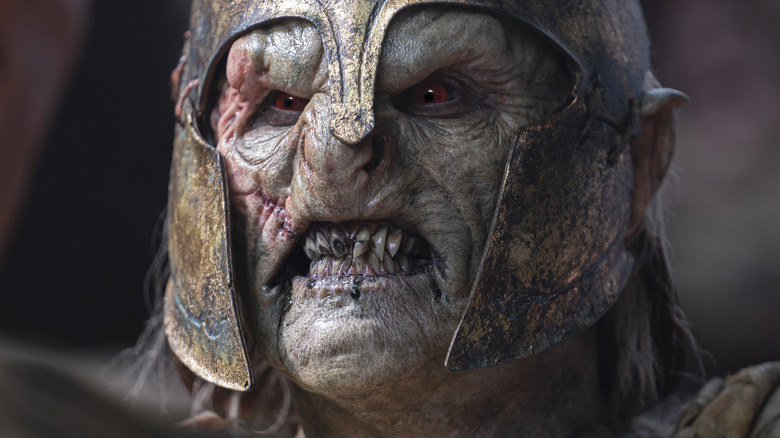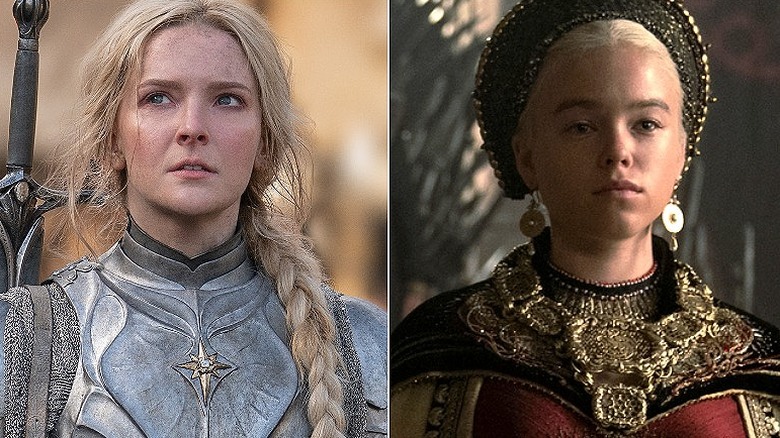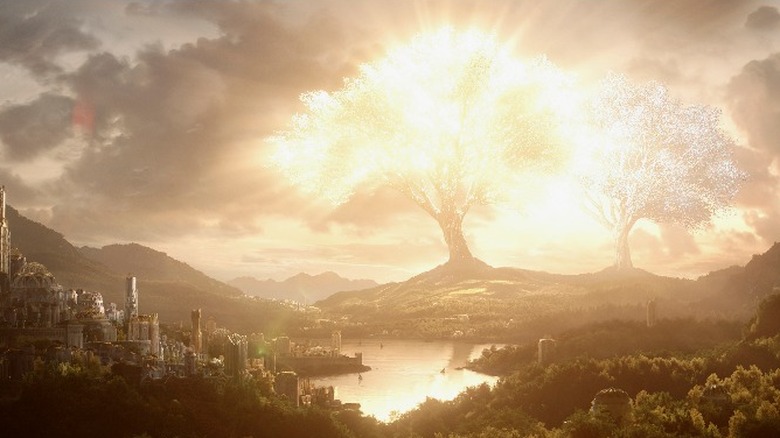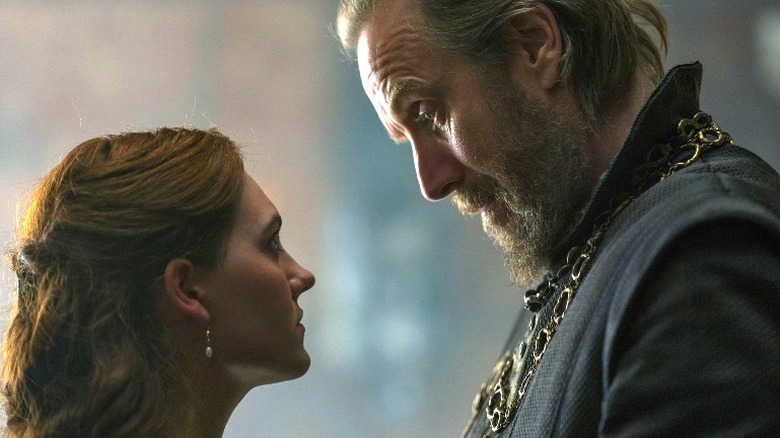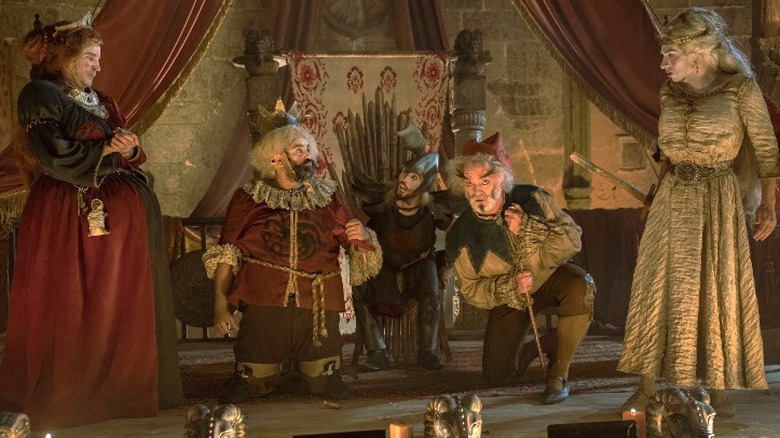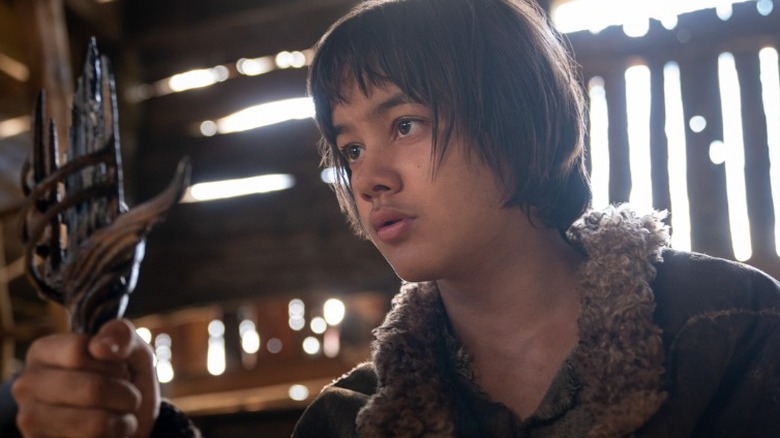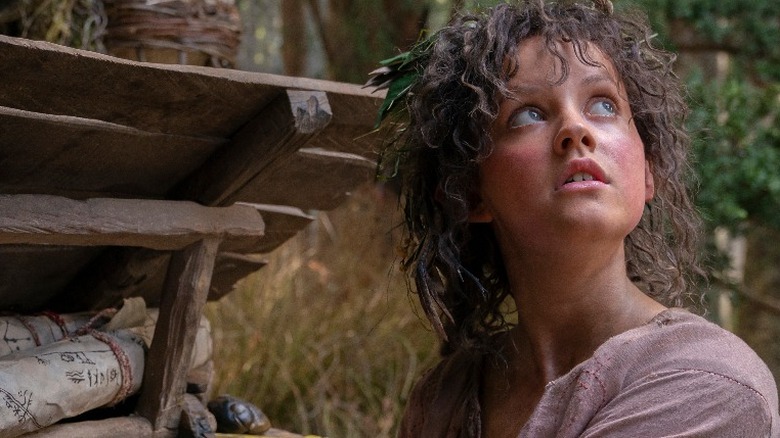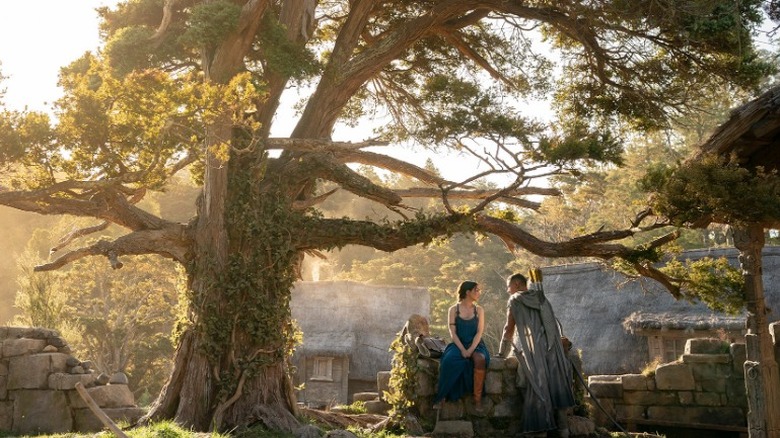House Of The Dragon And Rings Of Power Went Head To Head, And A Clear Winner Emerged
Executing a successful prequel is no small feat. Ensuring the stakes remain high and the narrative tension taut when an audience already knows the ultimate outcome is difficult enough, but when that story is an adaptation with a zealous fandom, the pitfalls increase along with the number of chainsaws to juggle. It's a task that requires precision, balance, and an unflappable prioritization of the story at hand, as opposed to the story to come that already was.
Of the fantasy genre's two most recent television adaptation prequels — Amazon's "The Lord of The Rings: The Rings of Power" and HBO's "House of the Dragon" — only one can be said to have managed these obstacles with ease from the start, all while giving a range of viewers an entertaining and thoughtful story in its own right. In one, we're granted access to a dazzling fantasy world whose various threads and themes invite both excitement and reflection. In the other, we're asked to ignore scaffolding and wait patiently for something to happen, all while the adaptation struggles to tease out "story" from "history."
That's right, folks. Despite the grievances of early haters (who were confused, at best, and at worst, racist) — and despite the ease with which "House of the Dragon" lured "Game of Thrones" defectors back to Westeros — thus far, the Amazon original "Rings of Power" has proven itself to be a better series than its HBO counterpart.
Rings of Power is fundamentally more successful
Why? Well, as gym teachers and dance instructors are fond of saying, you can't have fun without fun-damentals. And, while it's true the two series concern themselves with vastly different ideologies and ethos, they're both, at the end of the day, epic narratives. Unlike "Rings of Power," however, "House of the Dragon" has mismanaged some of the most basic and necessary elements of good storytelling, including, perhaps most apparently, proper pacing (as argued by The Daily Beast, The Ringer, and Salon).
To be very, very clear, "House of the Dragon" isn't boring because it's less sexist and racist than "Game of Thrones," or because it has — as one individual attempted to argue — "a feminist grooming agenda" (via Bounding Into Comics). It's boring because, while there may be many genres and stories out there capable of navigating a slow burn intro, a fantasy prequel about a family with literal fire breathing dragons isn't one of them.
But it isn't just that "House of the Dragon" brought us five slow, repetitive episodes in a row. It's that "Rings of Power" brought us a relevant, commanding, visually stunning, structurally sound, and emotionally resonant story — one that speaks as clearly to J.R.R. Tolkien's legacy as it does to viewers wholly unfamiliar with it. Notably, while the degree to which an adaptation mirrors its source material is a nonsense measure of success, in comparing these two series, the source material's own source material is relevant.
Rings of Power is, literally, more epic
Tolkien drew inspiration from a variety of sources, but the two most at play in "Rings of Power" are Norse mythology and "The Celtic Book of Invasions" (via JSTOR). Both of these traditions are, in the truest sense of the word, epic. George R.R. Martin's "Fire & Blood," on the other hand (and the story "House of the Dragon" focuses on), is a fictional account that folds fantasy into an actual period in 12th century England called The Anarchy.
The Anarchy is, undoubtedly, a riveting and revealing chapter in English history, but the mere addition of some woefully underutilized dragons and a barely contextualized, crabby little monster man aren't enough to turn a historical succession story into a screen-worthy fantasy epic. Anyone even vaguely familiar with Plantagenet history will find the series' first few episodes a fairly 1:1 reboot of reality, and just slightly more exciting than the reenactments in a Dan Jones documentary or Helen Castor's "She-Wolves: England's Early Queens."
While "Game of Thrones" also relied heavily on actual history, its central succession narrative is enhanced by a hefty helping of mystery and magic, a looming zombie apocalypse, and a litany of threads and settings, all of which make the original series feel more like Tolkien-esque worldbuilding and less like a fancy play about historical events.
House of the Dragon's scaffolding is showing
Source material structure (in addition to, but different from, its subject matter) is also important here. "Rings of Power" taps a faraway past that's referenced and built upon, just never fully detailed, in Tolkien's trilogy. "House of the Dragon," by contrast, cobbles together scenes and story from a fictional historical reference book, not a novel. Thus, the writers must pick and choose which vague allusions to events they'll highlight and flesh out, and how they'll use those events to speak to something greater than the straightforward story at hand. On this last point, "House of the Dragon" struggles, while "Rings of Power" speaks with ease to a number of universal fears, questions, conflicts, and existential dilemmas. In other words, in the Tolkien adaptation, fantasy serves and informs reality — not the other way around.
To-date, the HBO prequel is a kind of didactic, pastiche-collage hybrid, rather than an interesting, tension-filled story that prompts interpretation and thought. We're given flashes of action and semi-climax here and there, but they feel — thanks in part to the series' awkward pace and over reiteration — tacked-on, incongruous, and ornamental. As viewers, we're far too aware of the writers' forced attempts to connect and fill-in the historical dots, and the fact that we're presented with no fewer than three nearly identical exchanges between both young female protagonists and their fathers (for a sum total of six identically intentioned conversations) is both superfluous and demonstrative of another of the series' faults.
HBO doesn't trust us anymore, and it shows
"Rings of Power" trusts its audience to a degree "House of the Dragon" doesn't, or is afraid to in the wake of the fandom's response to the "Game of Thrones" series finale. In almost every important moment, we're first told what we're about to see via dialogue, then instructed on how to interpret it via score and framing, and then, finally, shown it via action — see: Sian Brooke's Aemma saying "the child bed is our battlefield," followed by a heavy-handed cross-cut of a violent joust and a violent delivery (a technique the series calls on again during the hunt in "Second of His Name").
Viewers don't need to be reminded, several times in the course of single episode, that if Rhaenyra (Milly Alcock) were a man, things would be different. Since that's the very obvious sticking point around which all that's to come will eventually pivot, to allow it so, so much explanatory space in the first five episodes (including a street play that functions as yet another explanation of a plot and subtext we already understand) isn't just holding the narrative back, it's another demonstration of the writers' lack of faith in viewers. Were all this repetition surrounded by (consistent) simultaneous storylines — a juggling act both "Game of Thrones" and "Rings of Power" do quite well — it might be easier to ignore. But at present, the series has given us too many moments of "in this essay, I will..." and too few moments wherein it actually just goes ahead and does.
Thankfully, Amazon's adaptation foregoes all this hesitation and wheel-spinning.
Rings of Power made smart sacrifices
An early criticisms of "Rings of Power" was that it didn't do enough explaining. One Collider article notes that "'The Rings of Power' doesn't take the time to re-explain the significance of what's going on. The sailing to Valinor and Sauron's symbol are characterized as important, but not fleshed out in detail."
From a storytelling perspective, this is a good thing, as it imbues the narrative with an intrigue sorely lacking in "House of the Dragon." Moreover, by the end of Episode 2, the implied meaning is pretty readily apparent. Are there really viewers out there who see a pitchfork-esque symbol glowing red with fire and accompanied by ominous, metallic resonance and think Sauron is a good guy? The article goes on to say that viewers will have to pay close attention to the series' opening sequence if they're to understand and fully appreciate the plot. Fair enough, but if we've reached an era in television wherein having to pay attention is a negative, then perhaps Morgoth has already won.
Yes, there's a fair bit of Tolkien mythology that "Rings of Power" necessarily sacrifices. But for the viewer less familiar with that mythology, it's a negligible loss. Only those fans with a strong grasp on all that history will be aware of its absence, and, since they already have a strong grasp on all that history, it hardly seems a necessary use of the series' establishing episodes.
House of the Dragon lacks the joy of Rings of Power
"House of the Dragon," in contrast, really requires some knowledge of Martin's world if one wants to appreciate any of its less than obvious cleverness. But although "Fire & Blood" readers will take some delight in learning which accounts the series has chosen to believe and promote (there are multiple, from multiple sources in the book), the series is otherwise, and utterly, devoid of anything resembling joy.
Wisely, "Rings of Power" is littered with moments of levity. From the humorous nature of the Harfoots, to the charming and relatable friendship between Robert Aramayo's Elrond and Owain Arthur's Durin IV, to the thrilling landscapes and Vermeer-worthy lighting, the wonder and novelty present throughout the series make the threat of evil's minions more present and terrifying. It's a heartless viewer indeed, for instance, who isn't both rooting and concerned for Markella Kavenagh's Nori Brandyfoot by the end of Episode 1.
To be clear, none of us wants a Targaryen Family sitcom (though someone should definitely write that). But five episodes in, this so-called fantasy is still operating like an historical soap opera à la "The Tudors" meets "Succession," and unfortunately, its refusal to give us a scrap of even the darkest humor only further weighs down an already sluggish storyline. Worse yet, it inhibits our ability to relate to, and subsequently care for, any of its main characters (our kingdom for an Arya Stark in this world full of Petyr Baelishes!). And yet, for all its seeming seriousness, the series lacks the grander, more meaningful resonance of "Rings of Power."
Rings of Power shows what fantasy can do for reality
Fantasy, at its very best, takes the empathy-building act of storytelling to its most extreme, exploring both the existential and the everyday via the epic and unreal. By inviting us to meet and accept new worlds and peoples, fantasy quietly forces us to investigate and question our real world convictions and biases — an important exercise in an era whose Almighty Algorithm ensures we almost never have to. Considering Tolkien's not-so-secret suspicion of industrial consumption and his equating of the machinery of greed and power with literal machinery (per The CLULJ), the Amazon adaptation's timing is a poignant commentary in and of itself.
What's more, by offering the capital letter "Good vs Evil" arc alongside a number of smaller, more intimate and relatable stories (e.g., Nori's inability to fit in, or Ismael Cruz Córdova's Arondir falling in love with a human) "Rings of Power" invites us to explore, question, and empathize with an openness that's thus far evaded "House of the Dragon."
The latter does foreground the all-too-relevant misogyny that drives its narrative, but its habit of repeatedly spoon-feeding viewers its thesis, and by focusing only on the overarching and realistic while largely avoiding the fantastic and metaphoric, it prevents us from proactively engaging in its subtext and inquiry. To quote Paddy Considine's King Viserys — whose insight inadvertently applies to the series in the most unfortunately meta way — "it hardly makes a good song, does it?"
It sure doesn't. At least, not one nearly as catchy and compelling as "Rings of Power."
